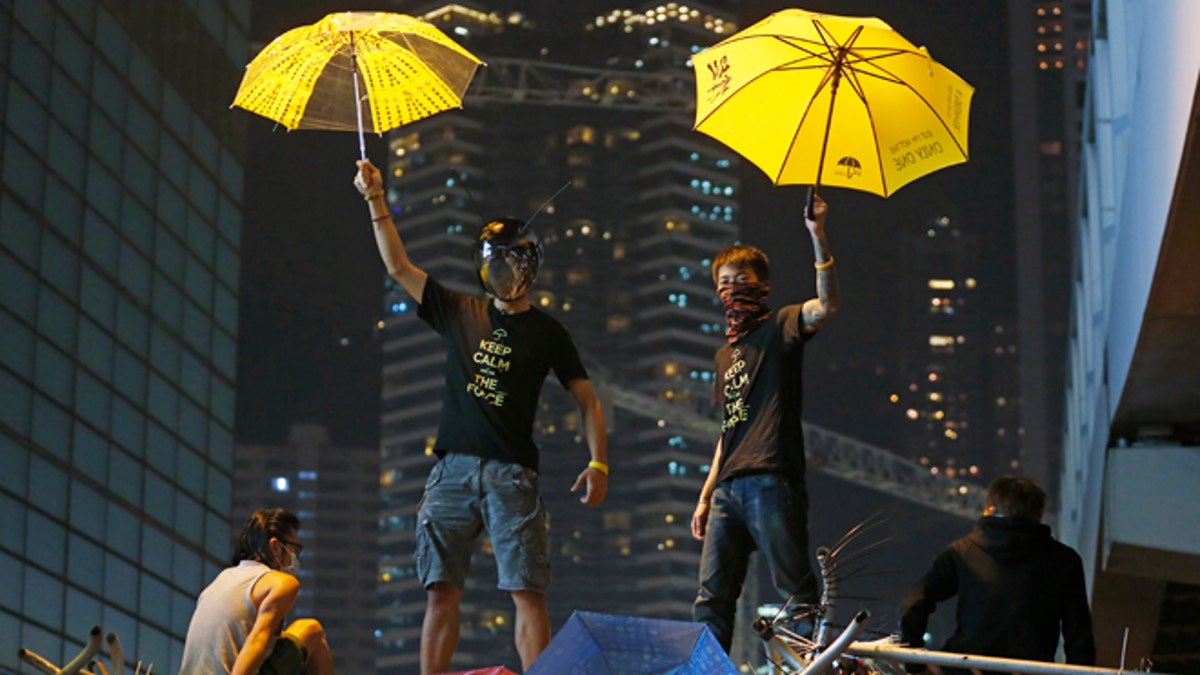
Dec. 10, 2014: Protesters pose for photographs on a barricade at the occupied area outside government headquarters in Hong Kong. (AP)
HONG KONG – Hong Kong authorities started clearing barricades Thursday from a pro-democracy protest camp spread across a busy highway as part of a final push to retake streets occupied by activists for two and a half months.
Court workers backed by police carried out a restraining order calling for barriers to be dismantled and obstructions removed from three sections of the protest site. Police then plan to move in to clear other blocked sections of road so that traffic can start flowing again.
The sprawling encampment in Hong Kong's Admiralty section, on the edge of the financial district, has been the focal point for the protesters, who have occupied the site for 75 days.
On Sept. 28 police fired dozens of tear gas rounds at thousands of protesters gathering in the area angry over the prolonged detention of a student leader. The move infuriated protesters and the wider public and kick-started the student-led protest movement, which came to include two other protest sites in Hong Kong.
The protesters reject Beijing's restrictions on the first election for the city's top leader, scheduled for 2017, but have failed to win any concessions from Hong Kong's government, and the movement's momentum has faded recently as the government stuck to its apparent strategy of waiting the protesters out.
Police say 655 people have been arrested in past 2 1/2 months, and 129 officers injured. They gave no overall injury toll.
A separate court order led to the clearing of the Mong Kok protest site in late November, but the operation and ensuing nighttime clashes in the gritty neighborhood's surrounding streets resulted in about 160 arrests.
Ahead of the removal of the barricades, police and a bailiff warned the public that anyone obstructing the bailiffs would be arrested.
On the eve of the action to clear the area, thousands of protesters and supporters streamed into the site for a last night of what's come to be known as the "Umbrella Movement," named for the pro-democracy protesters' preferred method of deflecting police pepper spray.
Many huddled in the hundreds of tents that remained on the normally busy thoroughfare outside of the specially administered Chinese city's government headquarters. Others took photos, listened to speeches and lined up for souvenir leather bracelets and other mementos handmade on the spot by volunteers.
Two student groups that played key roles in organizing the protests had called for supporters to stay until the last moment, but not to resist authorities.
Joshua Wong, the 18-year-old head of the Scholarism group and the pro-democracy movement's most prominent leader, urged supporters to stick to their nonviolent principles and not obstruct court workers or police.
"If the government wants to use police to clear the site, don't forget, the clearance can't resolve political conflicts, it can't resolve society's dilemma," he said.
Some protesters scrawled messages on the asphalt or balloon letters stuck on a wall to declare "We'll be back." Another large banner read "It's just the beginning."
The sprawling encampment in Hong Kong's Admiralty neighborhood, on the edge of the financial district, has become the symbolic nucleus of the protest movement.
The government said the headquarters complex would shut down Thursday and that 3,000 staff would not need to come to work.




















